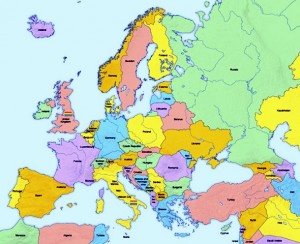Often when the issue of European social safety net practices is broached among Americans the argument eventually turns to the question of our racial and ethnic diversity and our large size versus other countries’ relative homogeneity and small size.  The argument asserts that the US cannot (and should not) implement European social practices because our large, diverse society does not lend itself to so-called “socialist” programs that might work in countries with more homogeneous (read: “mainly white”) populations.
The argument asserts that the US cannot (and should not) implement European social practices because our large, diverse society does not lend itself to so-called “socialist” programs that might work in countries with more homogeneous (read: “mainly white”) populations.
The actual evidence, however, belies this argument. If we can put the argument to rest, we can then more purposefully turn to our sister nations for important lessons on how to solve our seemingly intractable socio-economic problems. In our current season of protests centered around racism, white privilege and violence – not to mention all the social shortcomings that have come to light in the coronavirus pandemic – it is more imperative than ever that we find better ways to deal with our serious and longstanding challenges. We must look East, across the Atlantic!
Here we will cite three sources of information to make our case: the World Happiness Report 2020; Viking Economics by George Lakey; and Rick Steves’ Travel as a Political Act.
The World Happiness Report 2020
 We have commented on World Happiness Reports in the past: World Happiness Reports: Reflections on an AARP Interview, good government, socialisms, and the American workplace (#4). In none of the Reports since the first one in 2012 has the United States ranked higher than 11th (2012, 2013, 2015, 2016, 2017, 2018 and 2019).
We have commented on World Happiness Reports in the past: World Happiness Reports: Reflections on an AARP Interview, good government, socialisms, and the American workplace (#4). In none of the Reports since the first one in 2012 has the United States ranked higher than 11th (2012, 2013, 2015, 2016, 2017, 2018 and 2019).
It is primarily northern European countries, especially the Nordic ones (Denmark, Norway, Sweden, Finland and Iceland), that consistently rank in the top five or six over time. In the 2020 Report, the US ranked 18th.
Why are Nordic countries’ ranks consistently so high? As we have noted before, some of the basic reasons for these nations’ success, according to the authors of the 2020 World Happiness Report, boil down to the fact that “The top countries tend to have high values for most of the key variables that have been found to support well-being, including income, healthy life expectancy, social support, freedom, trust, and generosity.”
How do the successful countries achieve these goals? These countries tend not to leave progressive practices and programs like paid sick, vacation and parental leave up to chance or the private sector but, rather, legislate them. These nations have high individual tax structures, and that tax income funds programs that help all citizens, not just the needy; examples include free higher education, child support, health care, retirement benefits and public transportation.  These nations find creative ways to support small businesses, and they fashion productive public-private partnerships. These nations find pragmatic, workable solutions to problems rather than resort to worn-out ideologies. And the list goes on.
These nations find creative ways to support small businesses, and they fashion productive public-private partnerships. These nations find pragmatic, workable solutions to problems rather than resort to worn-out ideologies. And the list goes on.
Pertinent to our focus, the 2020 World Happiness Report Report spends a portion of a chapter to refute the standard homogeneity and size arguments. While a full reading is strongly encouraged, here are the main points:
- “[R]esearch has not found a relationship, either negative or positive, between the size of a country’s population and life satisfaction.”
- “[I]t is not ethnic diversity per se, but rather ethnic residential segregation that undermines trust…. [T]he economic inequality between ethnic groups, rather than cultural or linguistic barriers, seems to explain this effect of ethnic diversification lea
 ding to less public goods.”
ding to less public goods.” - “[I]n countries of high-quality institutions such as the Nordic countries, ethnic diversity might not have any effect on social trust.”
- “[T]he ratio of immigrants within a country has no effect on the average level of happiness of those locally born.”
- “[S]tudies have tended to find a small positive rather than negative effect of immigration on the well-being of locally born populations.”
Viking Economics
Sociologist, activist, and author George Lakey in Viking Economics has provided several ways to look at the homogeneity and size/scale issue. First, he asserts that, while cultural differences do matter when it comes to best practices for solving problems, ideas can definitely be taken from one society and modified to meet the needs of another. Examples include the US idea of national parks, now adopted by 200 other countries, and bullying prevention programs invented in Norway being adopted by schools in Pennsylvania and New Jersey (page 222).  Lakey cautions that we must avoid “diluting others’ proven practices instead of improving them;” an example of a diluted practice is our healthcare system as compared to that of the nations with the happiest citizens (page 223).
Lakey cautions that we must avoid “diluting others’ proven practices instead of improving them;” an example of a diluted practice is our healthcare system as compared to that of the nations with the happiest citizens (page 223).
Second, Lakey concludes that scale is not an impediment to huge improvements such as clean air initiatives and our interstate highway system (pages 225-26), both of which have been historically enviable. (Now, of course, the Trump Administration has defanged many clean air measures, and our infrastructure is in terrible condition.) Lakey asks pointedly with regard to free higher education, which most successful nations have provided for years and is now a proposal being strongly promoted by US progressives, “how does making higher education free depend on homogeneity?” (page 226).
Third, Lakey compares the fortunes of the two largest nations on the Iberian peninsula: Portugal and Spain. After citing statistics, Lakey concludes that “Spain is larger and far more diverse than is Portugal, yet has been more successful in developing an egalitarian society” (page 228, italics in original).
Lakey asserts several important things with regard to the homogeneity and size issue:
- “The greater cultural diversity in the United States . . . gives us an economic edge over the Nordic countries, if we choose to use it” (page 228).
- “A big and wealthy country like ours can take on many projects that are beyond the reach of smaller countries” (page 226).
 “[W]e can pay attention to culture without allowing ‘cultural difference’ to become a smokescreen hiding the cold interplay of special interests.” A special interest such as the medical profession vetoed President Harry Truman’s attempts to provide governmental health insurance programs at the time that the European nations were going down that road (pages 223-224).
“[W]e can pay attention to culture without allowing ‘cultural difference’ to become a smokescreen hiding the cold interplay of special interests.” A special interest such as the medical profession vetoed President Harry Truman’s attempts to provide governmental health insurance programs at the time that the European nations were going down that road (pages 223-224).
Travel as a Political Act
Travel writer Rick Steves is widely known and highly respected through his television show on Public Television, Rick Steves’ Europe, and his decades of well-researched guides. While loving the US and being grateful for being an American, Steves is unabashedly a Europhile. He has learned many lessons from his years of travel abroad and shares them generously with Americans in the hopes of educating us and showing us ideas that we can adopt to solve our complex problems.
Steves reminds us of what the European Union (EU) truly consists of: “Hop on a train for two hours and you step out into a different culture, different language, and different heritage. . . Europe is actually becoming more diverse.” He explains that there are three loyalties in Europe: region, nation, and Europe. Over time, the EU has come to accept the idea of “nations without states:” “groups of like-minded people, united by language, culture, and bloodlines that don’t have an internationally recognized country to call home.” Some of these nations without states include Basques, Catalans, and Bretons (pages 70, 72).
Steves describes the way the EU shows respect to these minority populations, thereby helping to create mostly peaceful coexistence rather than strife. In Barcelona, for instance, several languages are included on their ATMs: the minority Catalan language first, then Spanish, then several others (page 73). Steves tracks the fraught history of some EU nations vis-à-vis ethnic minorities and concludes, “the only viable option is to coexist peacefully – with a respect both for the mainstream cultural norms and the rights of the minority. . . . “[I]t makes me particularly thankful that the EU prioritizes the rights of nations without states” (page 74).
Europe still struggles with some of its diversity and immigration issues, to be sure – but, as we have seen, many if not most of those nations remain at or near the top of the World Happiness rankings.
Conclusion
The evidence takes us to a major societal conclusion: nations that have an ethos of solidarity, whose citizens trust their governments to work on their behalf, that routinely pass national legislation to solve social problems, that have progressive taxation and do not hesitate to “distribute wealth,”  that “tame” capitalism with robust social safety net programs and policies, that honor their diversity, and that look at problems pragmatically rather than ideologically are the most successful nations in the world with the happiest citizenry. The homogeneity argument is not only false and misleading but entirely irrelevant and, in fact, a smokescreen preventing us from instituting long-lasting solutions.
that “tame” capitalism with robust social safety net programs and policies, that honor their diversity, and that look at problems pragmatically rather than ideologically are the most successful nations in the world with the happiest citizenry. The homogeneity argument is not only false and misleading but entirely irrelevant and, in fact, a smokescreen preventing us from instituting long-lasting solutions.
Once more, let’s ask the basic questions: why do we Americans put up with the status quo?
- Why are we collectively intent to leap from crisis to crisis, wasting tremendous amounts of time, wealth and talent, to only temporarily solve some of our enormous social problems?
- Why do we keep using false arguments and warped ideologies to fool ourselves into thinking that the “American way” is the only or best way to live?
Shouldn’t it be now – in this period of tremendous anxiety, loss, unrest, violence and pandemic – that all of us say in the loudest collective voice possible, “enough is enough”? Should we not now be more ready than ever to follow the pragmatic, loving and communal examples of our sister nations and start implementing major social safety net measures at the federal level to truly become “a more perfect union”?
Resources
Helliwell, John F., Richard Layard, Jeffrey Sachs, and Jan-Emmanuel De Neve, eds., World Happiness Report 2020. New York: Sustainable Development Solutions Network, 2020.
Hill, Steven. Europe’s Promise: Why the European Way is the Best Hope in an Insecure Age. Berkeley and Los Angeles, CA: University of California Press, 2010.
Lakey, George. Viking Economics: How the Scandinavians Got It Right – and How We Can, Too. Brooklyn and London: Melville House, 2016.
Steves, Rick. Travel as a Political Act: How to Leave Your Baggage Behind. Berkeley, CA: Hachette Book Group, 2018; third printing 2019.
